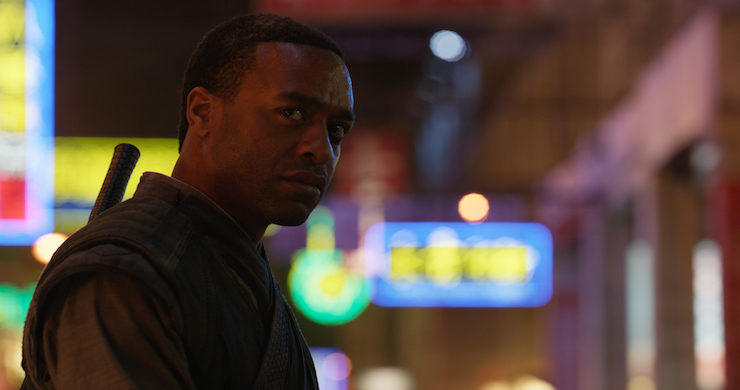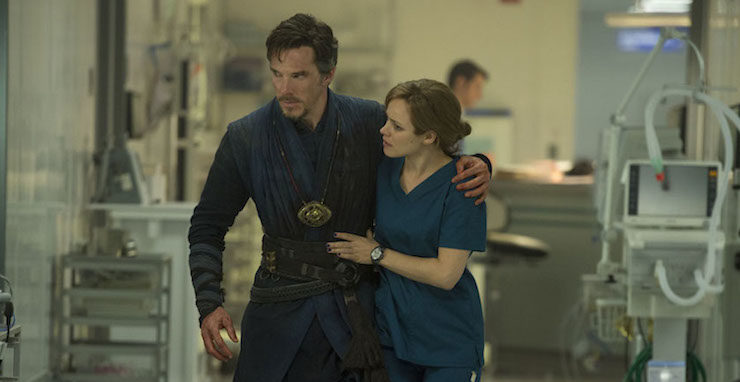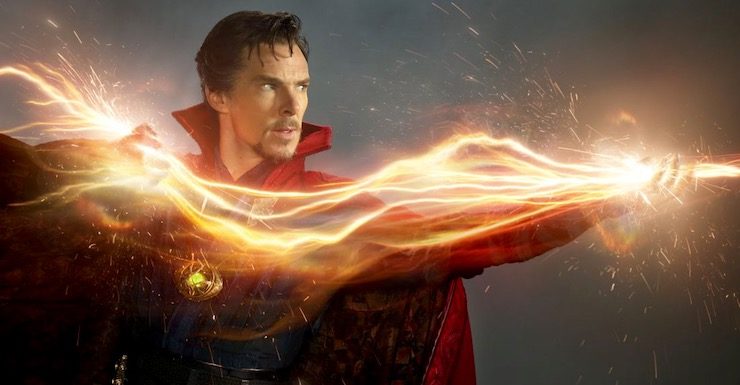These days there are three ways you can look at the relative success of a Marvel movie: as a part of the MCU, as an adaptation of the existing character, and as a film in its own right. In the case of Doctor Strange, it’s particularly appropriate that your perception of the movie will shift depending on which one of those perspectives you choose.
Let’s start with the good news. This is, for anyone with even a passing familiarity with the character, a really good adaptation. The exact basic principles of the comic are on screen: Stephen Strange is a brilliant, driven, egotistical surgeon whose hands are mutilated in a horrific car accident. Desperate to get his life back, he exhausts every option, eventually journeying to Nepal where he is taken in by a magic user called The Ancient One. She teaches him magic and along the way he meets Baron Mordo, Master Kaecilius, and Master Wong and gets a look at how the world truly works.
The script, by C. Robert Cargill and director Scott Derrickson is at its best when it both embraces those basic elements and subverts them. One of the film’s two best scenes sees Strange introduce the unflappable Wong (an excellent, and under used, Benedict Wong) to the wonders of Beyoncé. They’ve rebuilt Baron Mordo as a moralistic, driven figure who feels worthy of both more screen time and a movie in his own right. Finally, their take on The Ancient One is given a distinctly Gallifreyan, playful edge by Tilda Swinton. All three characters spend the first hour of the movie in particular being very successfully turned into something other than the sum of their parts. Even the much vaunted, surrealistic imagery of the original comic is given a glorious, Chthonic touch by Derrickson that feels alien and new, in a way that neither of the Thor movies managed and Ant-Man merely got close to. If, as seems likely, magic is going to be a big part of Phase IV, then this is the best possible introduction for it.
So, Doctor Strange is a great adaptation. It’s also a good Marvel movie. But, the increasingly troubling thing for the studio is that “good” has become its default. Marvel has yet to produce a film which is less than entertaining and Doctor Strange is certainly that. But it’s not very much more than that, and for a film with such a distinct visual identity, that’s bad news. The movie does an excellent job of introducing magic into the Marvel Cinematic Universe but as it finishes, you find yourself a little confused as to where it could possibly go next. There are some fantastic visuals and ideas but the film feels, for want of a better phrase, dangerously complete. There seems to be very little of the emotional growth that makes every Iron Man outing so fascinating, or the ongoing conversation about personal morality that elevates every Captain America movie. There’s not even the often flawed, often interesting exploration of the social and political impact the existence of superhumans would have on society that characterises the 2.5 Avengers movies we’ve had to date. Instead there’s a very good cape, a completely solid central performance, and little indication of the envelope being pushed beyond the pretty visuals.

And that brings us to the bad news. Not only does Doctor Strange as a standalone movie never get beyond the baseline of Marvel movie competence, but it also fails, severely, in several major ways. The casting choices for the film—specifically the casting of Tilda Swinton, Benedict Wong, and Chiwetel Ejiofor—have been the subject of a lot of well-deserved scrutiny, and all three choices are flawed for different reasons. Swinton’s performance is never less than good, but it’s impossible not to view her casting here as a missed opportunity to showcase an Asian actress in a major role—especially when you realize that Benedict Wong is the only Asian primary cast member in a film set predominantly in Nepal. Worse still, the film teases major developments in store for his character that it never quite follows through on. He is at least Strange’s equal, rather than his butler, but he’s also given precious little to do that doesn’t involve being the butt of Strange’s jokes.
Ejiofor’s is the most impressive performance of the three and, ironically, the one least well served by the movie itself. His Baron Mordo is arguably the movie’s strongest character: a fiercely moralistic, principled man who wants to do good and views himself, with some justification, as the hero of his story. He and Cumberbatch play off each other supremely well, too, and that’s what makes the final choices made here with Mordo so incredibly frustrating. Without going into specifics (in order to avoid spoilers), the film teases a welcome and much needed left turn, much in the same way it does with Wong—and then turns right anyway. In the case of all three actors, Derrickson and Cargill have argued very convincingly for their choices. In all three cases, for me at least, their choices lead back to a far more traditional and far less interesting place than the first hour of the film seems to promise.
Cumberbatch is very good, but he’s never less than very good. Also, to put it bluntly, he’s playing a flamboyant, socially awkward genius who has no patience for anyone outside his own head.
Yet again.

He gives Strange a couple of moments of welcome depth but it’s never more than that, and every obstacle he encounters is overcome with remarkable ease. There’s nothing to humanize him in the way that Scott Lang’s good-natured nervousness does in Ant-Man, or the way Peter Quill’s endearingly inflated sense of his own genius lends humor to Guardians of the Galaxy. Stephen Strange is a very clever, very gifted man who shows minimal emotional growth even as he wins, convincingly, for two straight hours.
In that respect, the film is a definite step backward. In the way that it treats its female characters, however, the film is a seven-league leap backwards. While Swinton is consistently solid (and gets at least one of the best jokes), Rachel McAdams is given nothing to do as Doctor Christine Palmer, other than patch Strange up and look long-suffering. The fact that this is the first installment of Marvel to immediately follow Luke Cage—a series redolent with interesting, varied, and complicated female characters—is unfortunate timing at best and profoundly offensive at worst. It’s not even that Marvel should be better than this—they often are. But not here.
The film even suffers technically. While the iconography is brilliant, reinventing spells as something surprisingly close to Tony Stark’s holographic interfaces, far too much of the physical action is dangerously muddy. Derrickson makes a deeply weird choice to use the motion of one shot as a means of cutting to the next one, so you continually find yourself rolling with the punches and not entirely sure where you are. It’s like a more focused—but just as unsuccessful—version of Paul Greengrass’ hyper-caffeinated action cinematography, and it buries a lot of the film’s best moments. Perhaps worst of all are producer Kevin Feige’s hints that both Wong and Palmer will be important parts of the Marvel Universe’s future: that’s great for the future, but doesn’t come anywhere near justifying how badly both characters are served, here.
And yet, for all that, this is a Marvel movie. There is the aforementioned solid baseline level of entertainment that the film never fails to provide. Cumberbatch really is very good; Ejiofor and Benedict Wong are fantastic, and Mads Mikkelsen is excellent, despite playing a villain whose motivation, again, seems to be a placeholder for a future movie. The visuals are dazzling, the soundtrack is Michael Giacchino at his gleeful prog rock dad joke best, and it’s never less than fun. But it’s rarely much more than that either, and with this character, at this stage of the MCU’s development? That’s really disappointing.
Alasdair Stuart is a freelancer writer, RPG writer and podcaster. He owns Escape Artists, who publish the short fiction podcasts Escape Pod, Pseudopod, Podcastle, Cast of Wonders, and the magazine Mothership Zeta. He blogs enthusiastically about pop culture, cooking, and exercise at Alasdairstuart.com, and tweets @AlasdairStuart.










